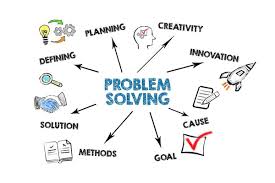Effective Problem-Solving Strategies: A Comprehensive Corporate Training Program
Overview:
Problem-solving is a crucial skill in the modern business landscape, allowing teams and individuals to overcome challenges, make informed decisions, and innovate. This corporate training program on problem-solving equips participants with a range of techniques, frameworks, and approaches to identify, analyze, and resolve complex issues effectively. Through a blend of interactive workshops, group discussions, case studies, and practical exercises, participants will develop their problem-solving capabilities and contribute more positively to their organization's success.
Module 1: Introduction to Problem-Solving
Understanding the importance of effective problem-solving in the workplace.
Differentiating between symptoms and root causes of problems.
The problem-solving mindset: embracing challenges as opportunities.
Module 2: Problem Identification and Definition
Techniques for identifying and framing problems clearly.
Defining problem statements using the "5 Whys" and "Problem Statement Canvas".
Stakeholder analysis: identifying key parties impacted by the problem.
Module 3: Analytical Tools for Problem Analysis
SWOT analysis: Assessing strengths, weaknesses, opportunities, and threats.
Fishbone diagram (Ishikawa diagram): Identifying root causes and contributing factors.
Pareto principle (80/20 rule): Prioritizing issues based on impact and frequency.
Module 4: Creative Problem-Solving Techniques
Brainstorming: Generating ideas and solutions collaboratively.
Mind mapping: Visualizing connections and potential solutions.
Lateral thinking: Encouraging unconventional approaches to problem-solving.
Module 5: Decision-Making Strategies
Rational decision-making: Evaluating options based on data and analysis.
Intuitive decision-making: Trusting instincts and experience.
Group decision-making: Techniques for achieving consensus and alignment.
Module 6: Implementing and Monitoring Solutions
Developing action plans: Setting goals, timelines, and responsibilities.
Change management: Strategies for smooth implementation of solutions.
Measuring success: Key performance indicators (KPIs) and progress tracking.
Module 7: Dealing with Resistance and Challenges
Overcoming resistance to change: Communication and engagement strategies.
Handling setbacks and unforeseen obstacles during implementation.
Adapting and iterating solutions based on feedback and results.
Module 8: Continuous Improvement and Learning
Creating a culture of continuous improvement within the organization.
Learning from failures and successes: The importance of post-mortem analysis.
Encouraging innovation and adaptability as part of problem-solving.
Wrap-Up and Evaluation:
Recap of key problem-solving techniques and concepts covered in the training.
Participant feedback and assessment of the training content and delivery.
Distribution of training materials, resources, and recommended reading.
